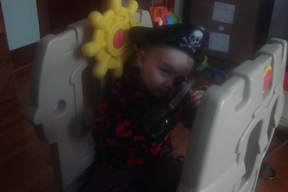 Many people don’t believe this, but I was a very shy person until about 10 or 15 years ago. My dad was also shy, but my mom was very gregarious. Mom knew everyone in town and knew how to use those connections. That helped my dad out a lot in his work as a newspaperman. He could bring her to events and meet all the important people. Everyone loved my mom and opened up to her immediately. All Dad had to do was stand there and listen. Unfortunately, my mother's outgoing personality was very hard on me. I felt as though I was always in her shadow, though she worked very hard at pushing me forward. I don't think she ever realized that the more she pushed, the more frightened I became. Now I work with children, and many of them are shy. Parents have different ways of dealing with their children’s shyness. Some of them push, as my mom did. Some parents do all the talking and interacting for them. Other parents ignore the shyness and let it take its own course. I always recommend the last tactic. Ignoring the shyness while continuing to support them and encouraging interaction at home seems to be the best way to help. Children act shy because they feel unsafe. We don’t always recognize why they feel that way. Maybe the situation feels completely safe to us, but we are not in their shoes. New situations can be difficult for all of us. Given the chance to come out of their shell on their own, children will often thrive. However, when we constantly rescue them or try to push them, it usually takes them longer to get to that safe feeling. No child will interact with others unless they feel safe, and we can’t talk them out of whatever they are feeling. They absolutely need to come to it on their own. Emotions are tricky. We sometimes get triggered by something that reminds of a different experience. As parents, we don’t always know what that trigger is or even what the experience was. Maybe your child got startled when he or she was an infant and this new experience reminds them of that time. It may have seemed so minor to you at the time, you don't even remember it, but they do. There could be a similar person or place, even a color or smell that triggers that memory. We will often never know what it is, but we must acknowledge that there is something getting in the way of their feeling of safety and accept it. It’s important for children to approach others on their own. We can certainly encourage them and model for them, but they must choose for themselves when they are ready to engage. In my classes, I am always open to every child with no expectations. If they want to smile at me or hug me, that’s great. I notice the smiles and smile back. I always accept hugs or high fives, if they’re offered. They are welcome to sit on my lap or ask to be picked up, but I never push myself on them. I do sometimes put them on the spot when we’re choosing activities, but I don’t let them squirm for long, encouraging them to tell their parent instead of me or letting the parent choose for them. Offering them the opportunity to choose is important, even if they’re not ready. And, sometimes they surprise everyone by stepping up to the plate, when they hadn’t previously. Sometimes, it just takes time … their own time.
0 Comments
 I am often the first one to defend our technological age. I love all of the advances I've seen in my lifetime. I had one of the first computers available to the general public back in the 80s and made sure my children learned how to use it. I own a smart phone and an iPad for my music files as well as a PC. When pagers became available, I bought one then a tiny portable MP3 player. I've had digital recorders, cameras, and the list goes on. However, I've seen the downside of these things as well, in my own life and looking around at others. When my children were young, I was actively involved with them, playing board games, going outside, hiking, cooking together and more. We did lots of arts and crafts and sang songs. We made their Halloween costumes and decorations. We strung popcorn and cranberries for garlands on our holiday tree. I had nothing in my pocket distracting me from paying attention to them. When my granddaughter was young, in the last couple of years that I was raising her, I had a computer with games on it. I had always sworn off them before, but now life was incredibly stressful with both of my parents dying and my 20-year relationship ending, and I needed something to take my mind off things. She very quickly got used to my absence and would come right to my office looking for me. Often, she didn't say anything but crept away to do her own thing. Sometimes, she would bring a book or toy in, so she could be close to me. Luckily, I quickly realized what was happening and limited my computer time to after she had gone to bed. Eventually I got a smart phone. Now, that distraction was available to me all of the time. It was sad how accepting she became of it. Her younger brother tried to interact with me and whatever game I was playing, asking questions and asking for a turn. This made me feel terrible, and I soon gave up all games. I was shocked at how addicting they had become. It may have been my hardest addiction to give up. So what are the ramifications of this trend? For one thing, we are giving our children a message that they are not important enough for our complete attention. We are also modeling dysfunctional behavior for them and helping to create a world in which everyone is virtually connected by physically or emotionally disconnected. And, most importantly, we are not always aware of imminent dangers. It has been found that there are more avoidable childhood accidents now than there were before cell phones became so common. I know that all children have accidents, and no matter how intently we are watching, things happen. But, there are more drownings, more children walking out in front of cars, etc. Many of these accidents have been due to parents being lost in their phones rather than watching their children. Also, child development is being hurt by the lack of emotional attachment found among families who depend on phones for communication and entertainment. Children learn how to communicate through actual verbal communication with their parents. Jack P. Shonkoff, a pediatrician and the director of Harvard’s Center on the Developing Child, refers to this as "serve and return." Babies and toddlers depend on verbal conversation to learn new words and learn how to use them properly. I found this wonderful article that explains it very well. www.theatlantic.com/magazine/archive/2018/07/the-dangers-of-distracted-parenting/561752/ So, does this mean that we all need to give up our phones? Certainly not. It just means that we need to be more aware of the time spent on our phones while our children are around. We should be interacting with them, having conversations where we look them in the eye. Mobile devices are important today, and our children need to be tech savvy. They should not be so dependent on them that they neglect physical contact with others, as I see often now. Teenagers are texting instead of chatting on the phone as I did at their age. They are obsessed with "selfies," posting photos of themselves instead of chronicling their memories as we did when we used cameras on vacations and events. They are missing those subtle verbal clues in the tone of voice or hesitations that we hear on the phone. They are missing the eye contact and physical clues that often help us understand what's really going on. And we are missing them when they text to us, their parents or grandparents. If one of my family members is texting more than a line or two, I insist that they call. I want to hear their voice. Video chatting can be fun if it doesn't dissolve into filters and silliness, though that has its place, too. It also enables us to have more meaningful contact with family and friends who are far away. As a grandparent, I valued my video calls with my grandchildren when they lived far away. And don't forget that anything we want to know about is right at our fingertips. All-in-all, technology is a wonderful thing and has its place in our society and our families, but let's not forget our emotional attachments and the art of conversation. Nothing replaces the time spent with our children without distraction, and they will grow quicker than we realize at the time. I hope you don't lose that precious little time while they are young. Cold and flu season is quickly approaching. Those of us with young children, babies or elders in our lives often worry about illnesses. When I first had my children, I had learned about natural remedies and later went on to study herbology at a Naturopathic school. I found that my children reacted much better to sometimes necessary drugs, such as antibiotics, when they were not overused. Of course, I was careful about not exposing them to many harmful germs passed on by other kids, but once my daughter started school, all bets were off.
Today, we read a lot about the advantages of exposing our kids to germs by not using lots of disinfectants or antibacterial soap. A dirty house sometimes equals a robust immune system. I must admit that my house was not always spotless, and my children seem to have a superhuman immune system. They rarely get sick and when they do, they recover in record time. Honestly, I don’t know if that’s due to genetics, exposure to household germs or to the measures I took with herbs to protect them. I’m sure there is no way to measure that, but whatever it was, it worked. When my children were babies, I often rubbed the bottom of their feet with garlic, then put warm socks on them. Within an hour, I could smell the garlic on their breath. I put a tiny amount on one spot first to be sure they wouldn’t have an adverse reaction. I did this during cold and flu season to ward off the illnesses but also did it once they contracted something. Garlic is a wonder drug that works especially well for colds but is too harsh to give to babies. However, their skin absorbs the essential oils in the garlic and distributes it throughout their bodies. Another herb that is safe for children and babies is chamomile. This is used as a mild sedative and used for teething babies, though if your child has an allergy to ragweed, they might have an adverse reaction to this herb. We often give catnip to our cats, but it also used for children’s low-grade fevers and to treat colic. Fennel and dill seeds are also good to treat colic or gas. My favorite herb for babies is calendula. I grow my own and make a salve for treating any skin irritations including diaper rash, cradle cap and eczema. I mostly use my calendula salve for cuts, scrapes and dry skin in the winter. All these herbs can be bought as essential oils, but I don’t recommend using oils for children under age 2. For these young children, except for garlic, I recommend putting the fresh or dried herbs into a bath. You can also give them tea to drink but remember not to put honey in it for babies under 1 year, and I recommend letting them get accustomed to the taste of the herb itself rather than masking it with a sweetener. They have a peasant taste already, and it’s good to help your children develop a more sophisticated palate. Here is a great link to simple home remedies for babies: https://www.mom365.com/baby/baby-health/home-remedies I am often asked when is the best time to talk to your child about sex. The short answer is as soon as they are born. This may leave some of you scratching your heads, wondering what I mean. The first step in teaching your children about sex is identifying body parts with the correct names. Use the right words, penis, testicles, vagina, labia, etc. This normalizes the vocabulary and starts to reduce the discomfort some of us have talking about this topic. But, the biggest rule of thumb is: answer all of your child’s questions accurately, but in an age appropriate manner, giving no more information than they ask for. Depending on your child, this can lead to embarrassing situations.
When my daughter was 3 1/2, I was pregnant with her brother. She was always very inquisitive and started asking questions immediately. How did the baby get in there? How did Daddy help make the baby? How exactly did he do that? How will the baby come out? An avid reader about child development, I knew that I should answer her questions but eventually had to make a judgement call to stop. Good thing, too. One day, we were riding on a city bus when a large man boarded the bus. My daughter looked him straight in the eye and asked, “Do you have a penis?” Understandably flustered, he didn’t answer. Without missing a beat, she then asked, “Do you use your penis to make babies like my daddy did?” I was horrified and got off at the next stop, far from our destination, just to get away from the looks I was getting from the conservative riders. As uncomfortable as that and other moments were, I was never sorry that we were so open about those conversations. We never had a “big talk.” It was ongoing, and my children talked to me about everything. I was never uncomfortable with our conversations, and neither were they. I also never worried about them having unsafe sex. It makes me sad to think about the numbers of kids who aren’t educated about sex except at school. It’s not the job of our schools to teach our children about sex. It’s ours. When we teach them about sex, we do it in the context of relationships. We model behavior for them everyday. We are modeling relationships, too. Sex is a part of a healthy adult relationship. Why hide that? My own parents were very much in love and very physical with each other. Although they were of a generation who didn’t feel comfortable talking with their children about sex, they modeled a healthy affection for each other, and my brother and I loved seeing them hug and kiss, and we would giggle when we saw Dad pull Mom onto his lap for a quick snuggle. My younger grandchildren love the game of acting grossed out when my partner and I kiss or hug. They say “ew” as they laugh and laugh. The more they react, the more we show them our love for each other. They know that and play along, reacting more and more animatedly. My older grandson, who is now 25 and used to play that same game, gave me one of the best compliments not long ago. He said that his current relationship reminds him of mine, so he knows it must be the real thing. That makes me so happy for him and for me. When my teenaged granddaughter talks to me about her relationships and about sex, I am reminded that I have approached the topic well. When we’re uncomfortable talking about something, it makes it mysterious and sometimes more attractive due to that mystery. In my opinion, openness and honesty are always the best policies. How do you navigate a relationship with an ex whom you no longer like? Or maybe you are still in love, but the pain is too hard to deal with at this time. I think it’s important to remember that these separations are hard on everyone, no matter how it came about or who was responsible. But, as hard as it is for the adults, it’s even harder on the children. The good news is ... there are some things we can do to make it a little easier on them.
The first rule of thumb is, “Never talk badly about your former partner!” It won’t always be easy. We all start out thinking that we will have no trouble with it, then something happens to spark our emotions. All of a sudden, the words come out. It takes a huge concerted effort sometimes to bite your tongue. But it’s even harder to remember not to talk about your ex on the phone with a friend while your children are in listening distance. We don’t always know that the kids are nearby. They are often out of sight but still within earshot, hearing things that they shouldn’t, so it takes even more awareness. Another important thing is, after the hardest part of the break-up is over, try to get along. My own children have told me how important it was to them that their dad and I remained friends. We were all still a part of the family. It was hard in the beginning, we did struggle to get along sometimes, but we didn’t have to see each other when we didn’t want to. Eventually, we became much better friends than when we were married, and I helped him pass at the end of his life. Make sure your children get enough time with each parent. When you are not the parent with physical custody, it’s easy to fall into that “sugar daddy” role. These are the parents who spend lots of money, give gifts, go on spectacular trips and more but don’t do the everyday disciplinary things. These parents don’t have to nag about homework and set limits. If you are in this role, try to be sensitive to your ex-partner's struggles. Equal time is the best plan, if it can be arranged. Your children love you both and need the same amount of time with each of you. The exception to this is if there is abuse of some kind. You must protect your children from abuse, but differences in parenting styles are okay. That's one of the advantages to having two parents. Lastly, back up the other parent. If your children think they can divide and conquer, they will go all out to do that. You won't know which way the wind blows. Always assume that the pther parent is doing the right thing and check with them. Don't automatically side with your child before investigating what really happened. We all know how dramatic children can be, blowing things way out of proportion. As much trouble as your child is making with you, you can bet they are doing the same at their other home. Don't allow that disruption to take hold. Try to remember that you chose to be with that other adult because you saw the good in them. Try to keep seeing that good, and you'll be doing your whole family a huge favor. This is another requested post. I really enjoy addressing topics that are relevant to you, so please continue to send your ideas to me. I've had tons of experiences with all types of behaviors and family issues with my own three children as well as others I have helped raise and my 40 + years of early-childhood teaching experience and am always happy to share what I've learned.
It is not unusual for children to exhibit signs of aggression during stressful times. It is not unusual for them to exhibit these signs even when we're not aware of their stress. The most common occurances are when a new baby comes into the home, after a move and leading up to a move, starting daycare or school or other big changes in their lives such as a parent going back to work after being home, divorce or separation, etc. But these are not the only reasons that children lash out at others. Some children have sensory issues and go into a panic mode when feeling cornered. Young children that bite often fall into this category. They are not "bad," they are just overstimulated or possibly are feeling cornered. I've seen many toddlers bite another child when they are literally up against a wall. When they do this, you can see the intensity in their body language and a wildness in their eyes. They are frightened and don't know how to keep themselves safe. If you have a "biter," it's important to notice what's happening around them and protect not only the opther children but your own child as well. When they hurt someone else, it is most often very sudden. Afterwards, they are confused and sad. They don't actually want to hurt their friends, but they are out of control of their emotions. Please don't tell them that they are bad, and don't yell at them or hit them. These are great ways to escalate the situation and cause more harm. There are so many great statements to use such as: "I can see you are feeling scared (angry, worried), but I don't want you to bite (hit, punch, kick) because that hurts people." "I can see that you feel sad about hurting your friend (brother, sister), is there anything you would like to say to them?" Insisting on an apology can be insignificant if your child is just repeating required words. They need to understand what they are saying and truly feel it. When I worked in an alternative school, we would bring children together, face-to-face, and have them talk to each other with supervision. If one child hurt another, the offender would have to face the hurt child while they cried and then talk to them when they were finished. No one likes to see someone cry, especially if you have been the cause of that crying. It changes the situation from aggression into compassion. Saying the words "I'm sorry" doesn't always equal compassion. It's often an automatic response without any real remorse. But feeling the discomfort of facing a crying victim makes it all very real. Once everyone has calmed down, you can all work together to decide what happens next. Then there are children who act out because they are facing tough (for them) issues. These children need to talk about what's going on in their lives. If they are resistant to talking, they can draw pictures. That often leads to some great conversations. We may think that our eldest child has accepted that new baby when suddenly, they throw a toy at him or her. They may start to give them a hug then suddenly, it's a choke hold. Again, they are not bad. They are showing you how upset they are with this new arrangement. Grab them up in a loving way, hugging and kissing them, showing them how much you love them and how important they are to you. Then talk to them about the inappropriate behavior. You can get them to realize how much they love their sibling and how much they are loved in return. When we punish this behavior, we help instill resentment. Suddenly, they are bad and the baby is the good one. That's not really the message we want to relay, is it? However, we do need to set limits and have concrete consequences. They did behave badly. Notice I said, "behave badly" not "are bad." There is a huge difference. Words are important, but so are actions. If your child bites or hits someone else, there needs to be an immediate consequence. Rather than saying, "You will be in a timeout." Try putting them in a timeout immediately. If they have had the opportunity to talk with the hurt child, ask what they think is an appropriate consequence. Children often surp[rise me with their sense of fairness even when it involoves giving themselves a consequence or punishment. When we encounter these behaviors in older children, it's a much bigger problem. This is something that needs to be taken very seriously. What is going on in their lives that is making them act out in this way? Can you get them to talk about it? It may be harder for them to talk to you, but maybe a family friend or a professional can help out here. Some couselors get children to act out their problems with puppets. Some older children can write fictional stories or draw pictures, make comic books. People behave aggressively for reasons that we may or may not be aware of, but it's important that they not stuff those feelings inside where they can fester and become even bigger. If you are unable to listen without getting upset yourself, please ask for help. Sometimes, the best listeners are those that are outside of the situation. As in the paragraph above, there need to be strong, concrete consequences involved. With older children, it's even more important for them to be involved in that decision. Be careful, though. They will often give themselves much too harsh sentences out of their own guilt. You need to provide the balance. We all feel shame or embarrassment when our children behave badly. We want them to be well-behaved, perfect kids. But, it doesn't always turn out that way, and it's not our faults. Our children are individuals and will react and behave in unique ways. They will keep growing and changing, facing new challenges. Who knows how they will meet those challenges. We just need to remember that they are inherently good and support them even during those uncomfortable times. I believe that everyone can be healed through love and understanding, as long as we don't ignore the issues. For more ideas: http://www.indiaparenting.com/home-/124_6127/tips-for-handling-an-aggressive-child.html I've been encountering more and more parents lately who are leaving their children with a caregiver to go back to work. It's become a necessary part of our lives in these modern times, but it doesn't make it any easier to do. I always try to remind those parents that it is probably harder on them than it is on their children. Kids love to be social. Babies who live in isolation often become socially awkward. They haven't learned how to interact with people other than their immediate family. None of us are born shy. We are born seeking the attention and approval of those around us. You can see that when you observe newborns. They are constantly seeking eye contact, reaching out to us with their eyes.
Even the most well-meaning parents can create shy children by keeping them away from others. Of course, we want to protect our children, but it's important not to overprotect them. Eventually, every child has to go out into the world, whether it's going to school, on a playdate or other activities without parental protection. It's a very good thing for children to have activities they do alone. That's what teaches them to navigate this wide world. Unfortunately for me, I didn't learn this until I was an adult and, as a result, made some very bad and dangerous choices. Luckily, I survived the consequences of my well-meaning parents' mistake, but many don't. So ... what does this have to do with parents going back to work? Everything! It takes a village to raise a child. Humans have known this for thousands of years. Relief for the parents is not the only reason for this. It is also for the well-being of the child. We are all very different. We have different styles of living and relating to each other. And, we encounter those varieties of styles in our lives. Don't we want our children to be prepared for that, as well? When a parent is forced to go back to work, they are forced to use the "village." It's a good thing. But, with the age of the nuclear family, we've forgotten how important it is to leave our children with friends, neighbors and relatives, and with elders who will impart their wisdom. If we only expose our kids to these rich resources when we are present, they will not get the same benefit. They will only get what we feel comfortable with, or what transpires from the relationship between the adults. I hear many tales from children about the wonderful times they have with their grandparents. As a grandparent myself, I know that I am very different with my grandchildren than their parents are. I have different rules. I eat different foods. I do different activities with them, and I teach them different things. It's not harmfull to them, it's helpful. It's the same thing when they go to daycare, whether it's a home daycare or an institutionalized daycare setting. They learn to navigate new situations. Now, the big question is, how do parents survive leaving their young children? Talk to other working parents. Don't be afraid to let your friends and family know where you're struggling. And, yes. Cry when you need to. Set your priorities so that spending time with your children is on the top of the list. Try not to focus so much on catching up with chores that you neglect yourself or your children. Try to include them in some of the chores, if they're old enough. A very young child can sort socks out of the clean laundry, or pull out towels to be folded. In that way, you are teaching them life skills and having fun together at the same time. And, don't keep them so busy with extra activities that they forget how to entertain themselves or don't have down time for using their imaginations. It's easy to feel guilty for not having what you think is enough time with them. Children are incredibly resilient and will make the most of what they have. Maybe we can learn from them. How many of us feel totally comfortable having conversations with infants? I imagine not everyone is raising their hand. When we talk to infants, we feel as though we are having a one-way conversation. It feels like we're talking to ourselves. In reality, we are talking to a sentient being who understands much more than we realize. Often they coo, or "talk" back to us. It can be frustrating not being able to understand what it is that they're saying, but they are definitely saying something.
I've been hanging out with infants more than usual lately and am struck by how intent they are when vocalizing. When we respond they listen just as intently. So, what should we be saying to them? Whatever we want to say. We can certainly tell them how wonderful they are, strong, capable and smart. But, we can also tell them about our day or narrate our activities as we go through our day with them. Babies learn to talk by listening to others. They learn the art of conversation from listening to conversations. When I talk to babies who don't yet have words that I understand, I often reply, after they've "said" something to me, "Wow, that's so cool." Or, "I didn't know that." In that way I am modeling a response which is an important part of conversation. Conversation is listening and replying with an appropriate response. Conversing with babies also signals their importance. We want them to know that we value them, so we pay rapt attention to them. They seek eye contact regularly. That eye contact helps keep them grounded. Conversation also help expand their vocabulary and often encourages them to speak early. That's why it's important not to do "baby-talk" with them. Talk to your baby as though (s)he understands every word. Don't simplify your vocabulary, rather expect them to learn it. People used to remark on what amazing vocabularies my children and grandchildren had at a very young age. That's because I spoke to them as I would an adult. That doesn't mean that I talked about complex ideas, but it means that I didn't dumb down the words I used. Babies start learning from the moment they are born. They are like little sponges, soaking up everything they see and hear. For that reason, please set aside your discomfort and talk to your baby as much as you can. They will thank you for it, maybe earlier than you expect. Remember that they are real humans inside these tiny bodies, trying to figure out how to communicate effectively. They work very hard at it, too. I think we should match their enthusiasm. We all want our children to be self-confident, but there is a fine line between self confidence and arrogance. Certainly, praising our children is the best way to instill self-confidence, as I have always done, telling them that they were capable of anything, if they worked at it. However, I also pointed out their challenges. When one of my sons behaved like a bully, I was right on top of it. When another son was allowing himself to be bullied, I dealt with that, too, not by stopping the bullies, but by helping him find his strength to stand up for himself. In that way, a child feels their self-worth and gains more confidence. My own mother always tried to fix everything which made me feel weak and incapable of taking care of myself. When I became an adult, I struggled to find my inner strength that would protect me from attacks. As a result, I went overboard with my daughter and eldest. I urged her to speak up for herself and ask for what she wanted at a very young age. Maybe she was a little too young when, at age three when we were at a fast food restaurant, I insisted she go up to the counter and ask for the extra ketchup she wanted herself. She did it though, and is now one of the strongest women I know.
In addition to the encouragement, we need to acknowledge that everyone has weaknesses, including our children. We don't do them any favors by ignoring those flaws. The more they can acknowledge where they struggle, the more their confidence will build and grow. One of my grandchildren is quite arrogant, believing they can do nothing wrong and have nothing to learn. I can see how that will hold them back in life. We grow through learning and are constantly learning new things, no matter how old we are. We do ourselves a terrible disservice in not recognizing that. As a grandparent, I can try to point things out, but in some cases the damage has already been done, and they will have to learn the hard way. Often I hear parents praise every little thing that their children do, no matter how minor. That's great, but it also instills an expectation of being praised. Of course, it's important to celebrate milestones like rolling over, first steps and the like. We are thrilled, and so are they. We want to clap for their achievements, and we should. But once those milestones have passed, those things should be normalized. Children should learn to progress because it is joyful to them, not to please us. They should be learning to love learning because it makes them grow and feel good, not because they want to please us. When we are trying to please others, we forget about ourselves, and it actually undermines our self-worth. We can be encouraging without being doting. With my dad, I felt as though nothing I did was ever good enough. It wasn't until after he died that I learned how proud he was of me and my accomplishments. I definitely could have used more praise from him. My mother, on the other hand, smothered me, never allowing me to live my own life and make my own mistakes. My life was made very difficult in trying to navigate these contradictions. Now, I make plenty of mistakes, but they are mine to make, and I learn from every one. I hope you will let your children do the same while you stand by supporting them, picking them up and dusting them off when they fall and always loving them throughout. I have parented with a partner and without. They both have their advantages and disadvantages. As a single parent, you make all the decisions and don't have to negotiate with someone else when you disagree on techniques. However, it is very difficult to raise a child on your own. It really does take a village to raise a child. One of the big advantages to my single parenting is that, having already raised two children with a partner, I understood the need for support. I quickly found a community and enlisted the help of those community members through trades for babysitting, shared dinners and more. I was always happy to have another child around for mine to play with. It made my life easier and made him happier. When I was 50, I was already raising a teenager and then started raising my granddaughter. I realized that I needed younger people with more energy to take her sometimes, and they did. She was so much of a community child, when I had to go to Europe for work, she happily went from family to family for the 2-weeks I was away. She was 5 and missed me, but these people were part of her extended family, and she felt safe and secure with them.
One of the hardest things about single parenting is the lack of time away from your child. When you have a partner, you can leave them with the other parent. When there is not another parent available, you may feel guilty about abandoning them or guilty about overburdening another family. I had to get over that and remind myself that I loved having other children around, so why wouldn't someone else feel the same? And, I always reciprocated. It isn't only single parents who don't go out enough, couples often don't have enough time together away from their children. Trading babysitting is a wonderful thing for everyone. It's good for our children to experience other routines. It promotes diversity and encourages flexibility. Another struggle for me was feeling overburdened by work and household duties. I wondered if my child was suffering from not having enough of my attention. I had to make the difficult decision to not worry as much about the condition of my house. Maybe the floor didn't get cleaned often enough or dishes always done on time, but it was worth it to have the time to play with my child. They are only young for a short time, and eventually, they start seeking out other people for stimulation. It's important to take time with them while they are interested. I didn't want to have regrets later on, so my chores had to wait. However, it was equally important for me to make sure that my child knew when I needed alone time. As single parents, we should be modeling self-respect and self-care. I didn't want my children to sacrifice themselves as adults because that's what I taught them. Children need to see us having fun and living a full life without the burden of guilt. They want us to be happy. One potential issue that goes along with being a single parent is the issue of dating. That one is tricky and needs its own post. Meanwhile, I can say that it's part of caring for ourselves, and we do want to model good adult relationships, too. Our children learn to love and be partners by watching us. Adding another person into the mix is definitely possible and is a process. I will write more on that next week. |
Archives
April 2019
Categories |




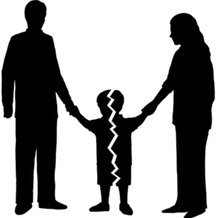

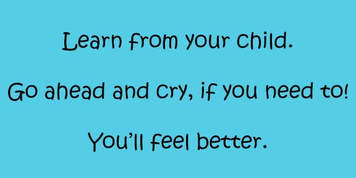
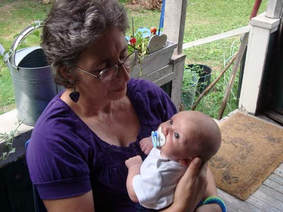
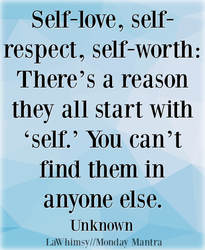
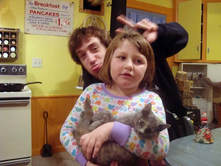
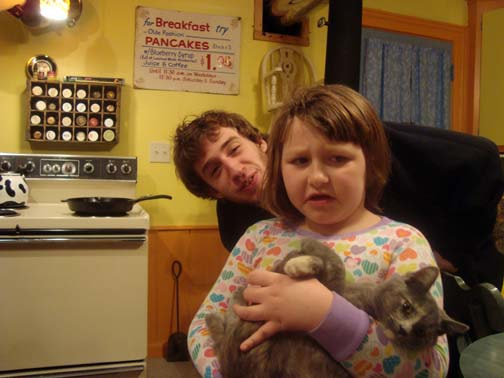
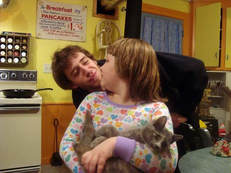
 RSS Feed
RSS Feed